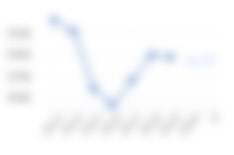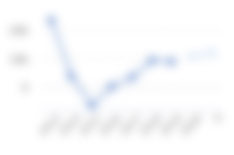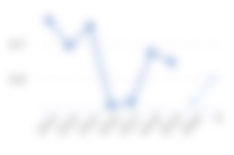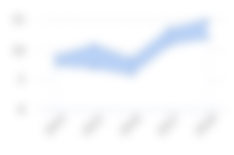- KR₩53bn
- KR₩127bn
- KR₩277bn
- 14
- 74
- 34
- 32
Growth & Value
| 12m Forecast Rolling | Industry | Market | |
|---|---|---|---|
| PE Ratio (f) | n/a | ||
| PEG Ratio (f) | n/a | ||
| EPS Growth (f) | n/a | ||
| Dividend Yield (f) | n/a | ||
| Valuation (ttm) | Industry | Market | |
|---|---|---|---|
| Price to Book Value | 0.19 | ||
| Price to Tang. Book | 0.19 | ||
| Price to Free Cashflow | n/a | ||
| Price to Sales | 0.37 | ||
| EV to EBITDA | n/a | ||
Shareholder Activity
| Type | Buy / Hold / Sell |
|---|---|
| Institutions | |
| Directors | |
| Community |
Guru Screens
Quality
| Name | Industry | Market | |
|---|---|---|---|
| Return on Capital | -4.63% | ||
| Return on Equity | -3.56% | ||
| Operating Margin | -11.78% | ||
Financial Summary
| Year End 31st Dec | Unit | 2020 | 2021 | 2022 | 2023 | 2024 | 2025E | 2026E | CAGR / Avg |
|---|---|---|---|---|---|---|---|---|---|
| Total Revenue | KR₩m | 210,114.31 | 295,670.38 | 358,311.81 | 436,092 | 277,180.78 | n/a | n/a | 3.44% |
| Operating Profit | m | ||||||||
| Net Profit | m | ||||||||
| EPS Reported | |||||||||
| Diluted Normalised EPS | |||||||||
| EPS Growth | % | n/a | n/a | -80.84 | n/a | n/a | n/a | n/a | n/a |
| PE Ratio | x | ||||||||
| PEG | |||||||||
| Profitability | |||||||||
| Operating Margin | % | ||||||||
| ROA | % | ||||||||
| ROCE | % | ||||||||
| ROE | % | ||||||||
| Cashflow | |||||||||
| Op. Cashflow ps | |||||||||
| Capex ps | |||||||||
| Free Cashflow ps | |||||||||
| Dividends | |||||||||
| Dividend ps | |||||||||
| Dividend Growth | % | ||||||||
| Dividend Yield | % | ||||||||
| Dividend Cover | x | ||||||||
| Balance Sheet | |||||||||
| Cash etc | m | ||||||||
| Working Capital | m | ||||||||
| NFA | m | ||||||||
| Net Debt | m | ||||||||
| Book Value | m | ||||||||
| Diluted Weighted Average Shares | m | ||||||||
| Book Value ps | |||||||||
Other Ratios
| Leverage (ttm) | Total | - Intang | + Pension |
|---|---|---|---|
| Gross Gearing | |||
| Net Gearing | |||
| Cash / Assets |
| Liquidity (ttm) | |
|---|---|
| Curr. Ratio | |
| Quick Ratio | |
| Interest Cov. | |
| Efficiency (ttm) | |
|---|---|
| Asset Turnover | |
| Recs Turnover | |
| Stock Turnover | |
Recent History
| Latest interim period vs. prior period | Industry | Market | |
|---|---|---|---|
| Sales Growth | |||
| EPS Growth | |||
| 3yr Compound Annual Growth Rate | Industry | Market | |
|---|---|---|---|
| Sales CAGR | |||
| EPS CAGR | |||
| DPS CAGR | |||
Profile Summary
DAEWON CO., LTD. is a Korea-based company principally engaged in the construction of apartment. The Company operates its business through three segments. Construction Segment is mainly engaged in the residential construction business. Fiber Segment is mainly engaged in the manufacture and distribution of yard. Other Segment is mainly engaged in the other business. The Company distributes its products within domestic market and to overseas markets.
Directors
- Last Annual
- December 31st, 2024
- Last Interim
- September 30th, 2025
- Incorporated
- February 21st, 1972
- Public Since
- December 1st, 2017
- No. of Shareholders
- 4,498
- No. of Employees
- 161
- Sector
- Real Estate Operations
- Industry
- Financials
- Exchange
Korea Exchange - KOSDAQ
- Shares in Issue
- 13,360,764

- Address
- 15, CHEONGJU, 28443
- Web
- https://daewon.co.kr/
- Phone
- +82 432641115
- Auditors
- Shinhan Accounting Corporation
Upcoming Events for 007680
Similar to 007680
Haesung Industrial Co
Korea Exchange - KOSDAQ
Silla Textile Co
Korea Exchange - KOSDAQ
FAQ
As of Today at 19:10 UTC, shares in Daewon Co are trading at KR₩3,930. This share price information is delayed by 15 minutes.
Shares in Daewon Co last closed at KR₩3,930 and the price had moved by -3.09% over the past 365 days. In terms of relative price strength the Daewon Co share price has underperformed the FTSE Developed Asia Pacific Index by -36.31% over the past year.
The overall consensus recommendation for Daewon Co is Strong Buy. You can view the full broker recommendation list by unlocking its StockReport.
Find out moreThe Daewon Co dividend yield is 3.05% based on the trailing twelve month period.
Last year, Daewon Co paid a total dividend of KR₩120, and it currently has a trailing dividend yield of 3.05%. We do not have any data on when Daewon Co is to next pay dividends.
We do not have data on when Daewon Co is to next pay dividends. The historic dividend yield on Daewon Co shares is currently 3.05%.
To buy shares in Daewon Co you'll need a share-dealing account with an online or offline stock broker. Once you have opened your account and transferred funds into it, you'll be able to search and select shares to buy and sell. You can use Stockopedia’s share research software to help you find the the kinds of shares that suit your investment strategy and objectives.
As of the previous close price of KR₩3,930, shares in Daewon Co had a market capitalisation of KR₩53bn.
Here are the trading details for Daewon Co:
- Country of listing: Korea, Republic of
- Exchange: KOE
- Ticker Symbol: 007680
Based on an overall assessment of its quality, value and momentum Daewon Co is currently classified as a Value Trap. The classification is based on a composite score that examines a wide range of fundamental and technical measures. Stock are classified on the the following spectrum: Super Stocks, High Flyers, Contrarians, Turnarounds, Neutral, Value Traps, Momentum Traps, Falling Stars, and Sucker Stocks. For more information, learn about our StockRank Styles.
We could not find analyst target price data for this security.
Find out moreAn important predictor of whether a stock price will go up is its track record of momentum. Price trends tend to persist, so it's worth looking at them when it comes to a share like Daewon Co. Over the past six months, its share price has underperformed the FTSE Developed Asia Pacific Index by -37.69%.
As of the last closing price of KR₩3,930, shares in Daewon Co were trading -13.62% below their 200 day moving average. You can read more about the power of momentum in assessing share price movements on Stockopedia.
The Daewon Co PE ratio based on its reported earnings over the past 12 months is null. The shares last closed at KR₩3,930.
The PE ratio (or price-to-earnings ratio) is the one of the most popular valuation measures used by stock market investors. It is calculated by dividing a company's price per share by its earnings per share.
The PE ratio can be seen as being expressed in years, in the sense that it shows the number of years of earnings which would be required to pay back the purchase price, ignoring inflation. So in general terms, the higher the PE, the more expensive the stock is.
We do not have data on Daewon Co's directors





